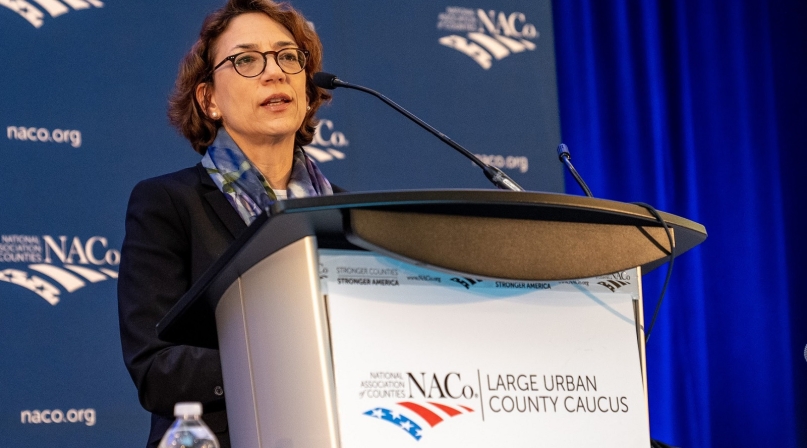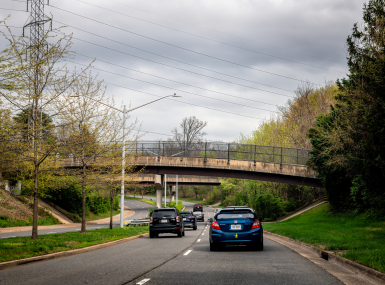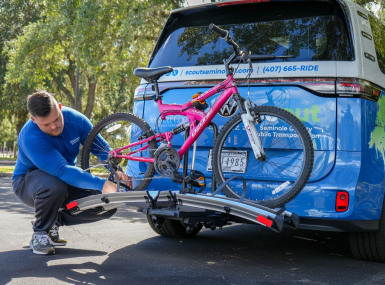Transportation, housing programs highlighted at LUCC business meeting

Key Takeaways
Polly Trottenberg and Erika Poethig shared their national expertise on transportation and housing, respectively, at a Dec. 1 Large Urban County Caucus business meeting to highlight federal programs and funding helpful to LUCC members.
Miami-Dade County Commissioner Eileen Higgins introduced Trottenberg, the U.S. Department of Transportation deputy secretary, as the keynote speaker.
“County governments own and operate nearly half of the nation’s public roads and bridges and directly support over one-third of airport and transit systems that get people connected in every corner of the country,” Higgins said. “…While folks often think of interstate highways when considering the national transportation system, these highways would be useless without the local bridges and roads that get us to them. Counties are a vital cog in a system that relies on functionality at all levels of ownership.”
Trottenberg brought attention to programs, under the Bipartisan Infrastructure Law, that counties can investigate for projects in their communities.
“One thing I’ve heard from your colleagues today, and I hear often when I encounter officials, in big counties and in small rural counties, is that sometimes working with the federal government can be a challenge, and we want to find every possible way we can to make that easy for you and to focus again on not only transportation, but how we can help tie into what you need to do on housing, on economic development,” Trottenberg said.
Trottenberg also highlighted the Bipartisan Infrastructure Law’s Safe Streets and Roads for All program, which provides funding for localities that develop a comprehensive safety action plan to prevent roadway deaths and serious injuries.
“We’ve had nearly 40,000 lives lost on U.S. roads [this year], and as I always say, these are not just statistics, these are family, friends, neighbors, coworkers,” Trottenberg said. “One thing I’ll note, and a lot of you all know this, we see that those fatalities are disproportionately on county roads. I think in some cases more rural than urban, but we recognize counties are incredibly close to this and we want to make sure that we’re working with some of the jurisdictions in this room right now to access these dollars.
“We encourage more sophisticated jurisdictions come in with a whole safety net, so you’ve done a data analysis where you’re seeing crashes or injuries and fatalities, you’ve really dug in on your data and have a comprehensive plan around how you want to tackle it. That can involve a redesign, education, driver behavior, you name it –– we want to make sure we’re working with communities at whatever stage they’re in, in terms of improving safety on the road.”
The Bipartisan Infrastructure Law also devoted $7.5 billion to EV (electric vehicle) charging and $2.5 billion in discretionary grant programs that counties should take advantage of, she noted.
“This is going to give you opportunities to come to us for the kind of charging infrastructure that you want to build,” Trottenberg said. “We recognize that for the interstates we’re putting in pretty standardized charging, but we know your localities and cities, communities, you want to look for things to create, maybe charging vehicles sharing vehicles, electric bikes, scooters –– you name it.”
Other funding opportunities for counties under the law include the airport terminals and bridge programs.
“These dollars can be used for adding new terminals, security systems, baggage, customs, enhancing enhancing ADA accessibility and you know, again, another place where we’re looking forward to working closely with you, we haven’t had these kinds of airport dollars before and it’s really exciting to start that process,” Trottenberg said. “We also have a lot of dollars now to invest in bridges … we know that is another huge need for a lot of counties.”
Poethig, special assistant to the president for housing and urban policy, referenced the Sixth Street Bridge project in Los Angeles County, Calif., which will connect the street and trail across the river to provide more mixed use and extensive development. She also spoke about housing accessibility and affordability, highlighting ways counties can take advantage of the Biden administration’s Housing Supply Action Plan.
“In Colorado, the DOT [department of transportation] has provided over $24 million to construct three new mobility hubs in Mesa County that allow for accessory dwelling unit construction by right use in residential zoning districts, incorporate more manufactured housing as a viable affordable housing strategy and present more opportunity for multi-family units,” she said.
Poethig said the administration is prioritizing access to housing and shelter that is well aligned to the houseless population’s needs and referenced a new initiative focused on unsheltered homelessness.
“We’re asking you to partner with us to ensure all levels of government are aligning to the strategies and using federal resources to strengthen your local approaches,” Poethig said. “…I think counties are the most important integrator and creator of resources across housing, health justice and education to meet the needs of more residents.”
Attachments
Related News

HUD seeks cross-agency approach to homelessness
"Self-efficiency" is in and Housing First is out at the Department of Housing and Urban Development.

Local government organizations send letter in support of the BASICS Act to congressional leaders
On February 16, nearly 80 state associations of counties and municipal leagues representing local governments in all 50 states sent a letter to the leaders of the U.S. House Committee on Transportation and Infrastructure and the U.S. Senate Committee on Environment and Public Works expressing their support for the Bridges And Safety Infrastructure for Community Success (BASICS) Act (H.R. 7437) and urging its inclusion in the next surface transportation reauthorization bill.

